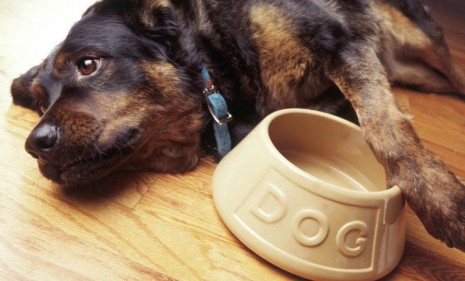The feds' new plan to save dogs from toxic food
A new system called PETNet will help authorities report and track contaminated dog and cat food — and, hopefully, save pet lives

A free daily email with the biggest news stories of the day – and the best features from TheWeek.com
You are now subscribed
Your newsletter sign-up was successful
In 2007, a rash of contaminated pet food was linked to the deaths of thousands of dogs and cats. In a renewed effort to avoid such tragedy, the FDA and the Partnership for Food Protection last week launched the Pet Event Tracking Network, or PETNet, a new system that will help federal and state agencies identify potentially tainted food and alert officials to threats. Here's what you need to know:
Why do we need PETNet?
The new system is a response to the massive 2007 recall of pet food that was tainted with melamine, an industrial chemical used in plastics and fertilizers. It's believed that thousand of dogs and cats died as a result of the contamination, which affected some 90 brands of dog and cat food, and was eventually traced to a certain ingredient, namely wheat gluten from China. During the 2007 outbreak, the FDA and state officials struggled to share information and communicate with each other in a timely manner. PETNet shows that "something good has come out of [that mess]," says Jeannine Stein in the Los Angeles Times.
The Week
Escape your echo chamber. Get the facts behind the news, plus analysis from multiple perspectives.

Sign up for The Week's Free Newsletters
From our morning news briefing to a weekly Good News Newsletter, get the best of The Week delivered directly to your inbox.
From our morning news briefing to a weekly Good News Newsletter, get the best of The Week delivered directly to your inbox.
How does it work?
PETNet has more than 200 members — federal, state, and territorial government officials from all 50 states, Puerto Rico, and Washington, D.C. They are charged with monitoring pet food safety and animal health, and, if they discover potential contamination or product defects within their jurisdictions, they can post information to the network, immediately alerting other members to potential problems. That sort of speedy, easy communication could prevent future pet food contamination problems from becoming out-of-control epidemics.
What can pet owners do to keep their animals safe?
After the 2007 recall, some pet owners switched to natural or organic pet foods, thinking it would ensure their animals' safety. Doing so may be a comfort to dog owners but, cautions Stein, "even these foods aren't immune to recalls, as some have been contaminated with salmonella."
A free daily email with the biggest news stories of the day – and the best features from TheWeek.com
Sources: About.com, Consumer Reports, Dog Channel, Feedstuffs, Food Safety News, Los Angeles Times, USA Today (2)